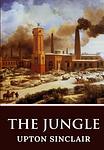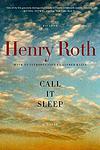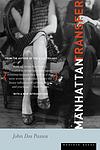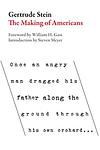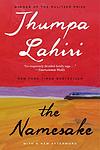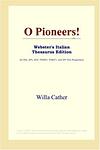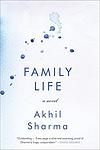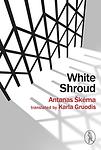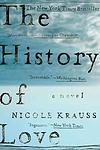The Greatest "Immigrants" Books of All Time
Click to learn how this list is calculated.
This list represents a comprehensive and trusted collection of the greatest books. Developed through a specialized algorithm, it brings together 284 'best of' book lists to form a definitive guide to the world's most acclaimed books. For those interested in how these books are chosen, additional details can be found on the rankings page.
Genres
The category of "Immigrants" in books refers to stories that center around individuals or families who have migrated from one country to another. These books explore the experiences, challenges, and triumphs of immigrants as they navigate a new culture, language, and way of life. They may also delve into the political and social issues surrounding immigration, such as discrimination, assimilation, and the search for identity. Overall, the "Immigrants" category offers a diverse range of perspectives and narratives that shed light on the complex and often emotional journey of leaving one's homeland and starting anew in a foreign land.
Countries
Date Range
Reading Statistics
Click the button below to see how many of these books you've read!
Download
If you're interested in downloading this list as a CSV file for use in a spreadsheet application, you can easily do so by clicking the button below. Please note that to ensure a manageable file size and faster download, the CSV will include details for only the first 500 books.
Download-
1. Pale Fire by Vladimir Nabokov
The novel is a unique blend of fiction, commentary, and poetry, presented as a 999-line poem written by a fictional poet, followed by an extensive commentary and foreword by his neighbor and academic colleague. The novel blurs the line between reality and fiction, as the commentator's notes reveal an alternative narrative, one of exile, intrigue, and murder. The book is a playful exploration of authorship, deception, and the nature of art.
-
2. The Jungle by Upton Sinclair
This novel exposes the harsh conditions and exploited lives of immigrants in the United States in Chicago and similar industrialized cities. The protagonist, a young Lithuanian immigrant, works in the meatpacking industry and experiences the extreme poverty, poor working conditions, and lack of social services. The narrative explores the corruption of the American meatpacking industry in the early 20th century and the hardships faced by the working class, leading to significant public outcry that contributed to the passage of the Pure Food and Drug Act.
-
3. White Teeth by Zadie Smith
This novel follows the lives of two friends, a working-class Englishman and a Bangladeshi Muslim, living in London. The story explores the complex relationships between people of different races, cultures, and generations in modern Britain, with themes of identity, immigration, and the cultural and social changes that have shaped the country. The narrative is enriched by the characters' personal histories and the historical events that have shaped their lives.
-
4. Waiting for the Barbarians by J M Coetzee
The novel is set in a small frontier town of an unnamed empire, where the magistrate lives a life of civil service and relative peace. His world is disrupted when the Empire declares a state of emergency due to rumors of barbarian uprising. The magistrate becomes a critic of the Empire's brutal and inhumane methods of dealing with the perceived threat, which leads to his arrest and torture. As he tries to understand his role in the vast political machinery, he also grapples with questions of power, justice, and humanity.
-
5. Call It Sleep by Henry Roth
This novel tells the story of a young Jewish boy, David Schearl, who immigrates to New York City with his mother in the early 20th century. The narrative explores David's struggles to understand his harsh father, his experiences with anti-Semitism and poverty in the Lower East Side, and his journey of self-discovery through his vivid imagination. The boy's fears and dreams are depicted through a stream-of-consciousness narrative technique, providing a powerful exploration of the immigrant experience and the harsh realities of the American dream.
-
6. Amerika by Franz Kafka
This novel tells the story of a young immigrant, Karl Rossmann, who after an unfortunate incident is sent by his parents to America. The narrative follows his journey through a strange new world, where he encounters a variety of eccentric characters and experiences a series of bizarre and often surreal situations. Throughout his journey, the protagonist struggles with feelings of alienation and the harsh realities of the American Dream, while trying to navigate the complexities of life in a foreign land.
-
7. Manhattan Transfer by John Dos Passos
This novel presents a panoramic view of New York City between the 1890s and the 1920s, capturing the sense of the city through the lives of its inhabitants. The narrative weaves together the stories of numerous characters from diverse backgrounds, including immigrants, businessmen, and bohemians. These characters' lives intersect and diverge, reflecting the dynamism and complexity of the city itself. The city is portrayed as a place of both opportunity and disillusionment, where dreams are both realized and shattered.
-
8. Americanah by Chimamanda Ngozi Adichie
The novel follows a young Nigerian woman who emigrates to the United States for a university education. While there, she experiences racism and begins blogging about her experiences as an African woman in America. Meanwhile, her high school sweetheart faces his own struggles in England and Nigeria. The story is a powerful exploration of race, immigration, and the complex nature of identity, love, and belonging.
-
9. The Making of Americans by Gertrude Stein
"The Making of Americans" is an experimental novel that explores the concept of identity and the human condition through the lens of two American families. The author uses repetitive and complex prose to delve into the intricacies of family dynamics, social status, and personal development. The narrative is less about plot progression and more about the philosophical exploration of what it means to be an American, offering a unique perspective on the cultural and psychological tapestry of the nation.
-
10. The Namesake by Jhumpa Lahiri
The novel tells the story of Gogol Ganguli, a second-generation Indian-American, who struggles with his unique name and his dual cultural identity. Born to immigrant parents from Kolkata, India, Gogol is named after the famous Russian author, Nikolai Gogol, a decision that shapes his life in unexpected ways. As he grows up, he finds himself torn between his parents' traditional Indian values and his desire to fit into mainstream American society. This internal conflict is further complicated by his relationships with women of different cultural backgrounds. The book explores themes of identity, cultural assimilation, and the immigrant experience.
-
11. Bread Givers: A Novel : a Struggle Between a Father of the Old World and a Daughter of the New by Anzia Yezierska
This novel tells the story of a young Jewish girl growing up in an immigrant family in the Lower East Side of New York City in the early 20th century. The protagonist struggles to balance her traditional father's Old World expectations with her own aspirations for education and independence, a conflict that embodies the tension between Old and New World values. The book explores themes of identity, assimilation, gender roles, and the immigrant experience in America.
-
12. Pnin by Vladimir Nabokov
The novel is about a Russian émigré, Timofey Pnin, who is a professor at an American college. Pnin struggles with the complexities of life, language, and American culture, while dealing with the traumas of his past in Russia. The book is a series of loosely connected episodes, filled with humor, pathos, and Pnin's endearing confusion. His struggles and triumphs in academia and his search for a home and identity form the crux of the story.
-
13. The Lonely Londoners by Sam Selvon
"The Lonely Londoners" is a novel that explores the lives of a group of West Indian immigrants living in London during the 1950s. The narrative follows the characters as they navigate the challenges of racism, poverty, and isolation in a new and unfamiliar environment. Despite their hardships, the characters also experience moments of camaraderie and humor, providing a nuanced portrayal of the immigrant experience.
-
14. Small Island by Andrea Levy
"Small Island" is a historical novel that explores the intertwined histories of Jamaica and the UK, as well as the themes of race, empire, and migration. The story is set in 1948 and is told from four different perspectives: two Jamaican immigrants, Hortense and Gilbert, who move to England after World War II, and an English couple, Queenie and Bernard. The narrative explores the racial tension, discrimination, and culture shock that the immigrants face in their new home, while also delving into the complexities of war, identity, and the British Empire.
-
15. How the Garcia Girls Lost Their Accents by Julia Alvarez
This novel follows the story of the four Garcia sisters, who are forced to flee from their home in the Dominican Republic to New York City in the 1960s due to their father's political dissent. The girls struggle to navigate the challenges of assimilation and cultural identity, as they attempt to reconcile their Dominican heritage with their new American lifestyle. The narrative explores themes of identity, family, immigrant experience, and the effects of political unrest, as the girls lose their Spanish accents and adapt to their new environment.
-
16. O Pioneers! by Willa Cather
"O Pioneers!" is a novel about a Swedish-American immigrant family's struggles and successes in the great plains during the late 19th century. The story centers on the family's eldest daughter, who inherits the family farm and devotes her life to making it thrive despite the hardships of weather, personal loss, and societal expectations. The novel explores themes of love, gender, land ownership, and the harsh realities of frontier life.
-
17. Giants in the Earth by Ole Edvart Rolvaag
"Giants in the Earth" is a historical novel that chronicles the story of a Norwegian pioneer family's struggles with the land and the elements of the Dakota Territory as they try to make a new life in America. It is a profound and accurate depiction of the trials, tribulations, successes, and failures of pioneer life, emphasizing the harsh realities of adapting to a new environment. The novel explores themes of man versus nature, cultural displacement, and the pursuit of the American Dream.
-
18. Family Life by Akhil Sharma
Family Life is a poignant, semi-autobiographical novel that follows the experiences of an Indian family that immigrates to America in the late 1970s. Their dream of a better life is shattered when the older son suffers a terrible accident that leaves him brain-damaged. The story is narrated by the younger son, who struggles with the pressures of his parents' expectations, the trauma of his brother's condition, and the cultural dislocation of being an immigrant in America. The novel explores themes of family, love, loss, and the immigrant experience.
-
19. Brown Girl, Brownstones by Paule Marshall
This novel explores the life of a young Barbadian-American girl growing up in Brooklyn during the Great Depression and World War II. The protagonist struggles with her identity as she navigates the cultural divide between her parents' traditional Barbadian values and her own American aspirations. The story delves into the themes of immigration, cultural identity, race, and gender, as the protagonist comes of age and seeks to establish her independence.
-
20. The Big Blowdown by George P. Pelecanos
"The Big Blowdown" is a gritty crime novel set in 1940s Washington, D.C. The story follows three childhood friends, Pete, Nick, and Joey, as they navigate the dangerous underbelly of their neighborhood. When Joey is brutally murdered, Pete and Nick are determined to find his killer and seek justice. As they delve deeper into the dark world of gangsters and corruption, they must confront their own demons and make difficult choices that will test their loyalty and friendship. With its vivid portrayal of post-war America and its compelling characters, "The Big Blowdown" is a gripping tale of crime, redemption, and the power of friendship.
-
21. The Enigma of Arrival by V. S. Naipaul
The novel is a semi-autobiographical work that explores the life of an unnamed protagonist who migrates from the Caribbean to rural England. As he grapples with feelings of alienation and displacement, he undergoes a profound personal transformation. He observes the slow decay of the English countryside and the changing lives of those around him, which mirror his own internal changes. The narrative is a complex exploration of themes such as identity, belonging, and the passage of time.
-
22. White Shroud by Antanas Škėma
"White Shroud" is a captivating and introspective novel that delves into the complex and fragmented mind of a Lithuanian immigrant living in Chicago during the 1950s. Through a series of disjointed narratives and poetic prose, the book explores themes of identity, cultural displacement, and the search for meaning in a foreign land. The protagonist's struggle to reconcile his past and present, along with his encounters with various characters, provides a thought-provoking exploration of the human condition and the universal quest for belonging.
-
23. The History of Love by Nicole Krauss
The novel intertwines the stories of Leo Gursky, a Holocaust survivor living out his twilight years in New York City, and Alma Singer, a 14-year-old girl trying to ease her mother's loneliness after the death of her father. Their lives are connected through a book, written by Leo in his youth as a tribute to his first love, that has been translated into English and published under a different author's name. As Alma investigates the true authorship of the book, their stories converge in a poignant exploration of love, loss, and the power of literature.
-
24. Hunger of Memory by Richard Rodriguez
"Hunger of Memory" is a memoir that explores the complexities of assimilation and cultural identity. The author recounts his journey as a child of Mexican immigrants growing up in America, detailing his struggles to balance his Mexican heritage with his American surroundings. From learning English in a Roman Catholic school to earning a PhD from an Ivy League university, the author grapples with feelings of alienation and the loss of his private identity, prompting a deep examination of what it means to be an "American."
-
25. Rites of Passage by William Golding
"Rites of Passage" is a historical novel that explores the journey of a young aristocrat, Edmund Talbot, who is traveling from England to Australia in the early 19th century. The story is told through Talbot's journal entries, which provide a detailed account of life aboard the ship, including the social dynamics, the harsh conditions, and the psychological struggles faced by the passengers and crew. The novel also delves into themes of class, power, and the human condition, culminating in a tragic event that forces Talbot to confront his own prejudices and assumptions.
Reading Statistics
Click the button below to see how many of these books you've read!
Download
If you're interested in downloading this list as a CSV file for use in a spreadsheet application, you can easily do so by clicking the button below. Please note that to ensure a manageable file size and faster download, the CSV will include details for only the first 500 books.
Download
